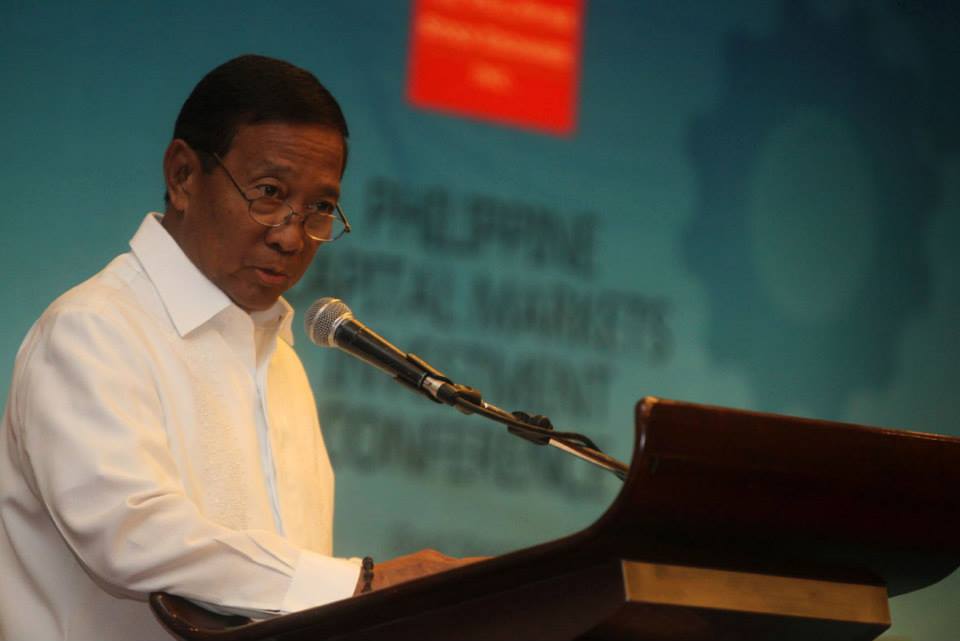
MANILA — Vice President Jejomar Binay on Monday said that economic expansion is meaningless if it does not eliminate poverty in the country.
“Allow me therefore to add nuance and character to these ideas as we discuss what ought to be, in the end, the real challenge of economic growth — that expansion is meaningless without inclusion, when it does not alleviate poverty, when economic gains are not shared with the marginalized sectors of society,” said Binay in his speech during the Financial Times-First Metro Philippines Investment Summit.
The Summit is a gathering of senior policy-makers, financiers, economists and business leaders to discuss strategies for the impending ASEAN integration.
The Vice President noted the economic gains under the Aquino administration, calling it a “springtime” for the Philippine economy.
According to Binay, the economic growth must be sustained by diversifying into job-generating sectors such as manufacturing, agriculture, and tourism.
He added that various critical areas need to be addressed to attract investments in these sectors.
At the same time, he pushed for revisiting the Constitution to allow the entry of foreign direct investments to the country.
“The goal is to liberalize the entry of foreign investments in economic priming sectors like infrastructure, energy and telecommunications,” he said.
He also urged increasing infrastructure spending, as well as fast-tracking the implementation of public-private sector partnership (PPP) programs, particularly in the transport sector.
“Parallel to our relaxation of the restrictions on foreign investments in the power sector, we must revisit the Electric Power Industry Reform Act (EPIRA). We need to unlock investments in alternative power generating systems to reduce the cost of electricity and expand power generation capacities in the power-short areas of Mindanao and the Visayas,” he noted.
“We must make our higher minimum wages irrelevant by raising workers’ productivity through expanded and aligned technical vocational education,” he added.
Binay also said that a true open skies policy, airport development program, and expansion of the portfolio of tourist destinations and activities in the areas of gaming, cutural and eco tourism, health and wellness, and retirement would boost tourism in the country.
The Vice President added that the Philippines’ agriculture industry should be modernized.
“And we must energize the development of small-, medium-scale community based enterprises by liberalizing government regulations for business start-ups. We need to expand the already vibrant micro finance sector and seed capital formation initiatives for small and medium scale enterprises in the Philippine Stock Exchange,” he said.
The Vice President also reiterated the need for a new execution paradigm for development plans that does not solely follow a top-down approach and is aligned with realities on the ground to truly achieve inclusive growth.
“Inclusion is achieved when the execution is aligned with sectoral, geographic and ground level realities. It means that we must understand the unique requirements of each economic, geographic or political sector and adjust our execution strategies accordingly,” he stressed.
“Inclusion, after all, is not just statistics. It must accrue to all citizens, rich and poor, one member of society at a time. Inclusion must have a name, a face and an address,” he added.
He recalled that his ideas on economic inclusion were honed over his 20-year leadership of Makati.
“From the outset, revenue generation has been one of the key elements of the Makati narrative. I distinctly recall meeting with a group of businessmen early in my term, where I made one simple promise to them: I will focus only on governance. I will work to provide the environment for business to grow, but you must do your share in supporting the government by paying your taxes, among other civic responsibilities. I kept my promise, and so did the businessmen,” he added.
Binay said: “The rapid growth of Makati’s revenue base was the result of our efforts to collect taxes more efficiently. I would like to emphasize that in those 20 years, we raised taxes in Makati only once, and that was to simply adjust the rates from municipal to city level. Just as importantly, the expanded revenue base was the direct result of the improved performance of the business enterprises.”
He emphasized that as Makati prospered, the city’s officials worked to ensure the continued expansion and stability of its economic fundamentals by improving revenue collection efficiency through technology.
Progressive land use and zoning policies were also adopted, besides granting incentives to emerging industries.
“But we knew that we could not just continue expanding the city’s economy. I knew, by simple common sense that expansion must necessarily precede inclusion. And so in Makati, we define inclusion not only to mean more money in the pockets of our citizens, but also greater access to opportunities for social and economic advancement and to services that are quality of life-enhancing. As revenues grew, we carefully focused the deployment of these resources on areas that would directly and sustainably benefit the city’s residents who needed them most,” he concluded.